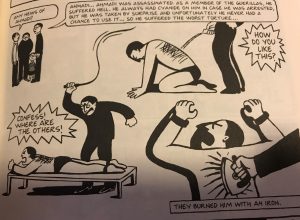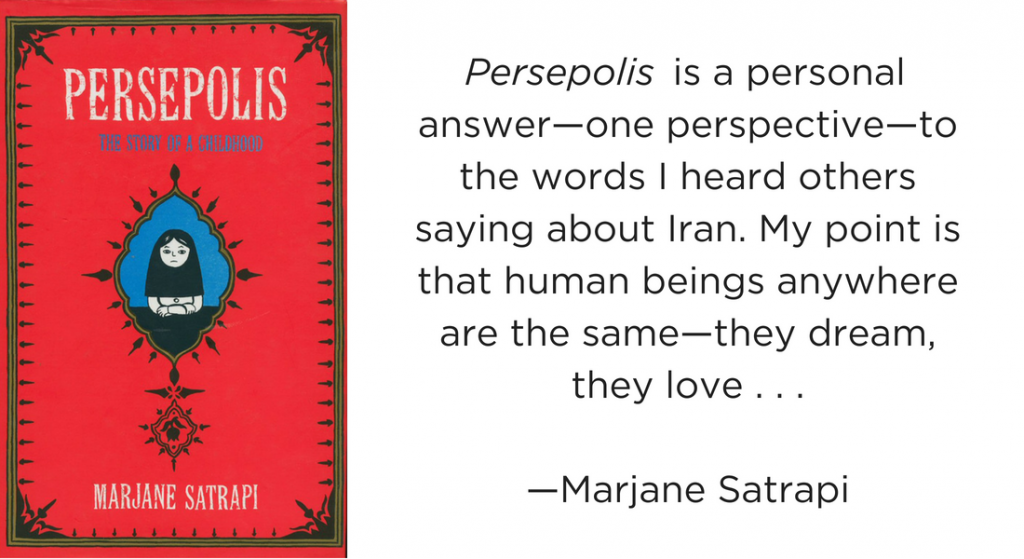Recently, my book club read and discussed Persepolis, Marjane Satrapi’s graphic novel memoir of her childhood during the Islamic Revolution. We were taken with the illustrations, Marjane Satrapi’s sense of humor, and her resilience as a child growing up with revolutionary parents during this scary time when the public culture of her country was suppressed and people could be jailed at any moment. Enchanting as the book is, it was difficult for us not to focus on the many times the book has been challenged and, sometimes, banned—it was the second most banned book in 2014, according to the ALA Top Ten list.
Following is the story of a banning that NCTE participated in solving. This story demonstrates both how easily a book can disappear from a classroom and how, with pressure from students, teachers, community members, and press, the book can return.
Winter 2013, Chicago, Illinois. Persepolis: The Story of a Childhood has been part of the seventh grade curriculum in the Chicago Public Schools for six or seven years and it’s been taught in the senior English class at Lane Tech College Prep High School.
On March 14 Lane High School staff members received the following email:
“Yesterday afternoon, one of the Network Instructional Support Leaders stopped by my office and informed me (per a directive given during the Chief of Schools meeting on March 11) that all ISLs were directed to physically go to each school in the Network by Friday (3/15) to: *confirm that Persepolis is not in the library, *confirm that it has not been checked out by a student or teacher, *confirm with the school principal that it is not being used in any classrooms, *and collect the autobiographical graphic novel by Marjane Satrapi from all classrooms and the library. I was not provided a reason for the collection of Persepolis.”
This banning of Persepolis as “inappropriate,” if publicity and furor are any measure of the effects of banning a book, it raised a huge ruckus throughout the city and beyond! The CPS CEO responded on March 15:
“Persepolis is included as a selection in the Literacy Content Framework for seventh grade. It was brought to our attention that it contains graphic language and images that are not appropriate for general use in the seventh grade curriculum. If your seventh grade teachers have not yet taught this book, please ask them not to do so and to remove any copies of the book from their classrooms.
“We have determined Persepolis may be appropriate for junior and senior students and those in Advance Placement classes. Due to the powerful images of torture in the book, I have asked our Office of Teaching & Learning to develop professional development guidelines, so that teachers can be trained to present this strong, but important content. We are also considering whether the book should be included, after appropriate teacher training, in the curriculum of eighth through tenth grades. Once this curricular determination has been made, we will notify you.
“Also, please be reminded that central school library collections are governed by the New Collection Development Policy for School Libraries. We are not requesting that you remove Persepolis from your central school library. Therefore do not remove this book or any other book from the central school library, unless you have complied with the policy.”
This memo did not settle the furor. Numerous stories appeared in the press—print and broadcast.
At Lane Tech College Prep High School, students stood up for the book, which they’d already read in a senior English class. Led by senior Katy McDermott, who noted “It’s time for us to have our voices heard,” students staged a “honk if you love free speech” demonstration outside the school. There were signs and megaphones, and over 100 students, teachers, and free speech enthusiasts attended. They stood on the sidewalks in sleety Chicago winter weather encouraging motorists to honk. Motorists did.
The Chicago Teachers Union was furious that the district ignored the expertise of the teachers to teach the book, suggesting that they needed special “training” to do so. They called the ban “Orwellian doublespeak.”
Below is the offending panel cited by the CPS CEO in The Guardian article and likely the panel—half a page of a 160-page book—that fueled the knee-jerk reaction of CPS to pull the book without putting it through an appropriate challenge process (see an example in NCTE’s The Students’ Right to Read). Note this is the way of most text challenges: someone finds something they don’t approve of on page whatever, they ignore (or maybe never read) all the rest of the text for the entire meaning, they complain, flashing the page or scene around, and then some other well-meaning but uninformed person sees that the text is at least put into the challenge process or, as in the case of CPS, bans it outright.

This Chicago Tonight program with American Library Association Office of Intellectual Freedom Executive Director Barbara Jones, Chicago Teachers’ Union financial secretary Kristine Mayle, and Katy McDermott and Alexa Repp, two students from Lane Tech, puts a face on those who stood against the banning. In a comment during the program, Kristine Mayle noted that it’s ironic that the CPS Curriculum for the book instructs teachers to ask their students as they’re reading Persepolis, a question that we all need to ask, especially when selecting and challenging texts,
“CAN YOU JUSTIFY THE RESTRICTION OF SOMEBODY’S RIGHTS IN THE NAME OF PROTECTING THEM?”

